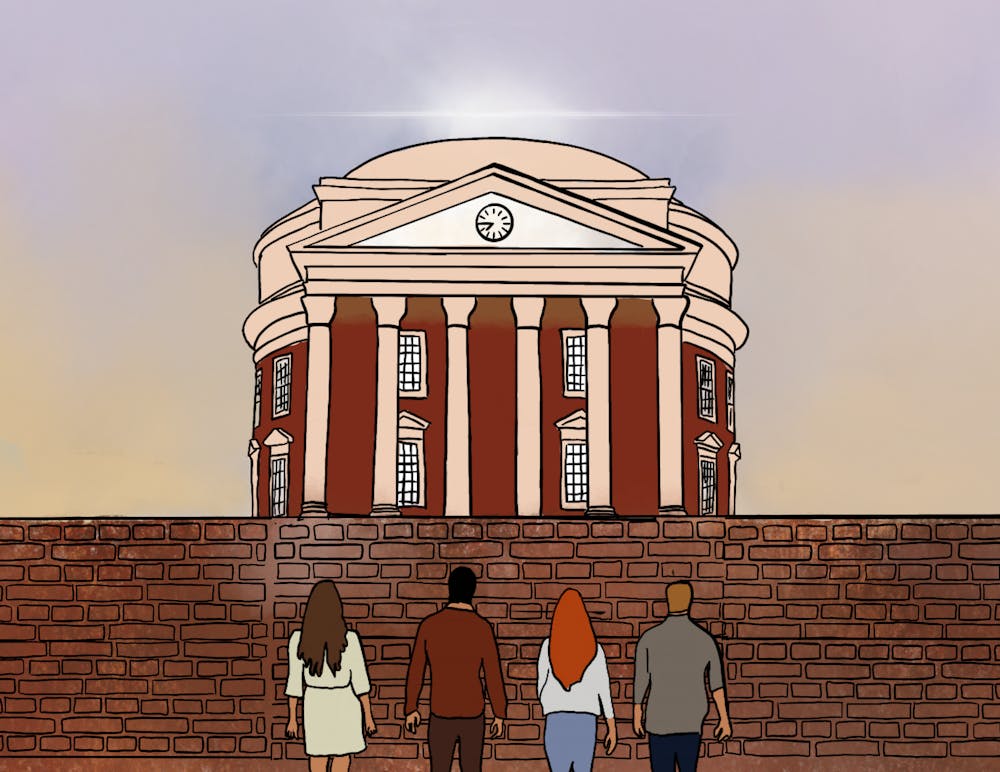Over winter break, universities all over the country urged their international students to return as soon as possible, preempting the possibility of travel bans or visa freezes under the Trump presidency. Similarly, Deferred Action for Childhood Arrivals applicants have returned to Grounds with a renewed concern about their legal status in the country. President Donald Trump has taken drastic measures since assuming office, including threatening to deport students who criticize Israel and flaunting the prospect of sending immigration enforcement officers to schools. Thus, the fear — and the need to plan around the possibility of deportation — is real for noncitizen students at the University. As difficult as the uncertainty may be, the University administration and student government must reassess their policies to protect any students on Grounds.
During both of his campaigns, Donald Trump ascended to the presidency as a candidate whose biggest promises included “mass deportations” and a tightening of the country’s borders. He took a particularly tough stance against China and Mexico — the former being the second largest source of international students in the U.S. and the latter being the largest source of DACA applicants. Trump’s first term saw an attempt to rescind DACA and a proposed a limit on Optional Practical Training — a pathway for STEM graduates to work in the U.S. He also issued a demand for international students to be deported during COVID-19 because classes were asynchronous. While the country has only been through a couple of weeks of his second term, Trump’s insidious record of immigration policy has proven time and time again that noncitizen students are not safe under this administration.
It is often difficult to relate to the pressures that noncitizen students face — especially since they make up such a small amount of the larger University background. Less than five percent of undergraduate students from 109 different countries come from an international background. An even smaller portion of the faculty are noncitizens themselves. But despite that, the scale of their contribution to the University is enormous. 2024 saw six international students receive awards for outstanding leadership and academic excellence. Their achievements highlight the outsized impact of international students, proving that even a small fraction of the student body can shape the University's academic landscape in meaningful ways.
While international and noncitizen students have positively impacted the University, the reverse is also true — the University has benefited these students. For example, DACA has positively changed the lives of young immigrants by providing them with an education and an opportunity to integrate into American society. And for international students, the global perspective provided by studying in America is not found anywhere else. Many travel thousands of miles and pay massive amounts of money to pursue a world class schooling and find opportunities to establish themselves. These opportunities are a crucial bedrock of the “American Dream.” Therefore, it makes it that much more disappointing to see them under attack.
During the first Trump administration, the University administration played a successful role in supporting noncitizen students when they moved to expand access to financial aid and admissions for DACA recipients in spite of legal challenges to the DACA program. The University took a brave stand then, and the change in the presidential administration requires a similarly brave commitment to safeguard these students.
But students can also play a role in supporting their international and noncitizen classmates. With Trump’s decisions to threaten and revoke the legal statuses of noncitizen students, legal routes to the University are categorically under fire. Therefore, Student Council must remedy some of the ills that befall marginalized members of the student body. We should consider expanding Student Legal Services to include assistance for noncitizens — which it currently does not. The Student Council constitution empowers them to resolve student grievances, and since SLS falls under the prerogative of the council, it is in our interest to expand it.
Beyond that, students need to see a commitment by the University to challenge the federal government on immigration enforcement which affects students. In 2020, Trump’s attempt to deport international students was only stopped because of a lawsuit filed by Massachusetts Institute of Technology and Harvard University. The University’s options may be limited when bringing a suit because it enjoys a complicated system of sovereign immunity, but it must resist Trump’s actions through whatever legal means are available.
As for international students, the International Studies Office remains the only administrative branch completely dedicated to helping students maintain their statuses. ISO has been tremendously helpful in keeping students informed when it comes to renewing their statuses and planning return trips, but at this moment, that is not enough. Wellesley College has set a strong precedent by organizing informal discussions for international students to voice their concerns, issuing them red cards listing their rights and connecting them with immigration attorneys to discuss potential problems. ISO should meet a similar standard in proactivity.
It is reasonable to not want the University and its institutions dragged into a lengthy fight with the federal government. But the reality is that supporting noncitizen communities helps ensure that their success trickles down throughout the rest of society. Our current student and University leaders have hesitated when it comes to responding to changing legal dynamics for noncitizen students. Now is the time to act, proving our commitment by protecting and expanding programs that keep the University open and accessible to all.
Muhammad Ali Rashid is a senior associate opinion editor who writes about student self-governance for The Cavalier Daily. He can be reached at opinion@cavalierdaily.com.
The opinions expressed in this column are not necessarily those of The Cavalier Daily. Columns represent the views of the authors alone.







